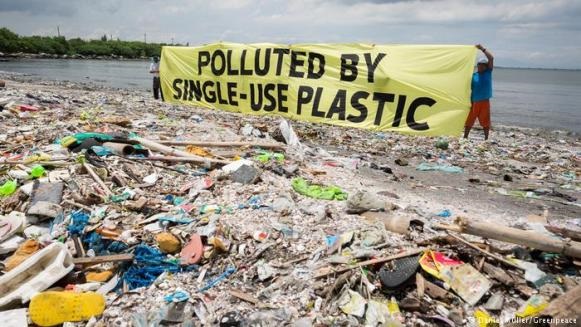The UN Environment Programme (UNEP) has published a report on single-use plastic products (SUPPs) and recommendations for alternatives, based on life cycle assessment (LCA) studies. UNEP defines SUPPs as “an umbrella term for different types of products that are typically used once before being thrown away or recycled,” including food packaging, bottles, straws, containers, cups, cutlery, and shopping bags.

An estimated 100-150 million tonnes of plastics are produced for single-use products, which is almost 50% of all plastic produced.
The report, titled: “Addressing Single-Use Plastic Products: Using a Life Cycle Approach”, was prepared following a resolution adopted at the fourth session of the UN Environment Assembly (UNEA-4) in March 2019 addressing SUPP pollution.
The resolution (UNEP/EA.4/R.9) encourages countries to promote the identification and development of environmentally-friendly alternatives to SUPPs, taking into consideration the implications throughout their full life cycle. The resolution also requests UNEP to make existing information available on the full life-cycle environmental impacts of plastic products compared to products of alternative materials.
In response, the Life Cycle Initiative began work on meta-analyses of LCA studies on SUPPs and their reusable and single-use alternatives, including for shopping bags, beverage bottles, take-away food packaging, beverage cups, tableware, nappies/diapers, pads and tampons, and face masks.. Each analysis highlights advantages and disadvantages of alternatives and summarises messages for policymakers.
Based on the LCA studies, the report recommends:
- Promoting reusable products;
- Reducing the use of single-use products, irrespective of material;
- Considering geographical and social context;
- Promoting resource-efficient product design and circularity;
- Decreasing the environmental footprint of production;
- Opting for low-impact end-of-life scenarios; and
- Factoring in potential future scale-up and innovations.
The report summarises lessons learned and key findings from country-specific case studies of national action to address pollution from SUPPs using a life-cycle approach, including in Canada, Colombia, the EU, Mauritius, New Zealand, Peru, Rwanda, Saint Lucia, Singapore, and Thailand. Lessons and recommendations include, among others:
- All materials have an impact, with the most sustainable being reusable products;
- Addressing SUPPs pollution requires systems change;
- A life cycle approach can help identify trade-offs and prevent burden shifting among value chain stages;
- Access to quality, timely, and location-specific data on the plastics sector is critical to inform policy development and evaluate policy effectiveness;
- Many actions and solutions are already being implemented to address SUPP pollution, including by stakeholders at local, regional, and international levels;
- Opportunities should be explored for new business models and support to help scale up activities;
- A mix of policy interventions is required, as well as understanding the underlying economic drivers for behaviour;
- Behavioural research provides insights on how different policies can target people’s actions regarding the use of SUPPs;
- All stakeholders (in particular the private sector, civil society, and women’s groups) must be involved in developing and implementing policy across the life cycle of SUPPs;
- Monitoring and enforcement are critical for implementing SUPP policies; and
- A well-communicated timeline of policy and legislative action can help the transition to support policy objectives.
The report also notes that the COVID-19 pandemic has presented significant challenges for countries to reduce SUPPs.
